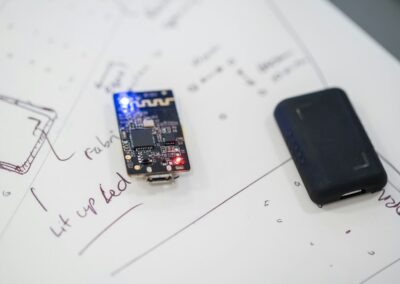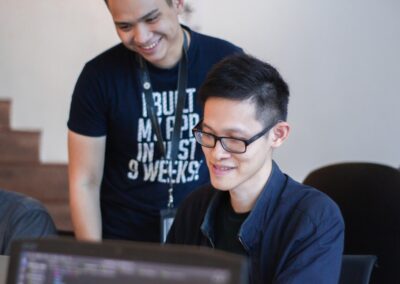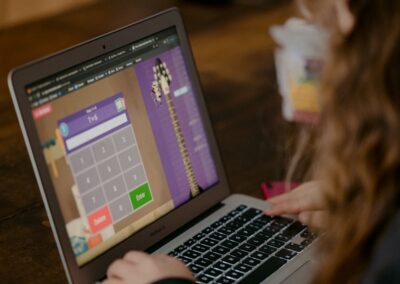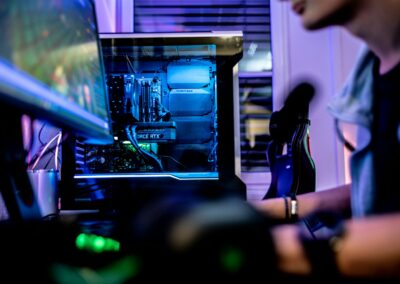Transforming Education with Gamified Learning
Meeting Diverse Learning Needs through Gamification
The advent of gamified learning has significantly transformed the educational landscape, particularly in Saudi Arabia and the UAE. Gamified learning integrates game mechanics into the learning process to create engaging and interactive educational experiences. This approach is especially effective for differentiated instruction, catering to the diverse learning needs and styles of students.
In Riyadh, schools have adopted gamified platforms to deliver personalized learning experiences. These platforms allow educators to tailor instructional content to meet the individual needs of each student. For example, a gamified math app might adjust the difficulty of problems based on a student’s performance, ensuring that they remain challenged yet not overwhelmed. This personalized approach helps students progress at their own pace, leading to better comprehension and retention of material.
Dubai’s educational institutions are also leveraging gamified learning to address diverse learning styles. Visual learners benefit from rich, interactive graphics, while kinesthetic learners engage with hands-on activities and simulations. This multi-faceted approach ensures that all students, regardless of their preferred learning style, can grasp complex concepts effectively. As a result, gamified learning not only enhances academic performance but also boosts student engagement and motivation.
Integrating Artificial Intelligence in Gamified Learning
Artificial Intelligence (AI) plays a pivotal role in the implementation of gamified learning. AI algorithms analyze student data to provide real-time feedback and adapt instructional content accordingly. In Saudi Arabia, AI-driven educational games offer personalized tutoring, identifying areas where students struggle and providing targeted interventions. This dynamic feedback loop ensures that students receive the support they need to succeed.
AI also enhances the interactivity of gamified learning environments. Natural language processing and voice recognition technologies enable students to interact with educational games using voice commands, making the learning experience more immersive and accessible. In Dubai, AI-powered language learning games are helping students improve their proficiency in multiple languages, contributing to their overall academic success.
Moreover, AI’s predictive analytics capabilities allow educators to anticipate student needs and adjust instruction proactively. By analyzing patterns in student performance, AI can identify potential learning gaps before they become significant issues. This proactive approach to differentiated instruction ensures that all students receive the appropriate level of challenge and support, fostering a more inclusive and effective learning environment.
The Role of The Metaverse in Education
The Metaverse, a virtual shared space created by the convergence of virtually enhanced physical reality and persistent virtual reality, offers exciting possibilities for gamified learning. In the UAE, educational institutions are exploring the use of The Metaverse to create immersive virtual classrooms where students can interact with peers and teachers in a highly engaging environment. This virtual space enables personalized learning experiences tailored to each student’s needs.
In Riyadh, schools are developing virtual science labs within The Metaverse, allowing students to conduct experiments and explore scientific concepts without the limitations of physical resources. These virtual labs provide a hands-on learning experience that enhances understanding and retention of scientific principles. Additionally, The Metaverse facilitates collaboration among students from different parts of the world, promoting cultural exchange and global awareness.
The Metaverse also supports the integration of advanced technologies such as blockchain and generative AI. Blockchain ensures the security and transparency of student records, while generative AI creates personalized learning scenarios based on individual student data. These technologies enhance the effectiveness of gamified learning by providing a secure, adaptive, and engaging educational environment.
Enhancing Academic Performance with Gamified Learning
Boosting Cognitive Skills and Knowledge Retention
Educational games have proven to be effective tools for enhancing cognitive skills and knowledge retention. By presenting learning materials in a game format, students are more likely to stay engaged and retain information. In Riyadh, schools are using gamified learning to teach subjects like mathematics and science, where students can apply theoretical knowledge to solve real-world problems.
Research indicates that students who engage in gamified learning demonstrate better memory retention and problem-solving abilities. This is because games provide a multisensory learning experience that stimulates different parts of the brain. In Dubai, educational institutions are leveraging game-based learning to improve students’ performance in standardized tests, with notable success.
Moreover, educational games promote collaboration and communication among students. Multiplayer games, in particular, encourage teamwork and the development of social skills. In Saudi Arabia, group-based educational games are being used to foster a sense of community and enhance students’ interpersonal skills. These collaborative experiences not only improve academic performance but also prepare students for the collaborative nature of the modern workforce.
Generative AI and Adaptive Learning
Generative AI is revolutionizing gamified learning by creating adaptive learning environments that cater to the unique needs of each student. This technology generates personalized content and scenarios based on students’ progress and performance, ensuring that each learner receives a tailored educational experience. In Riyadh, schools are implementing generative AI to create customized learning modules that address the specific needs of their students.
Generative AI also enables the development of complex simulations that replicate real-world challenges. In Dubai, educational institutions are using AI-generated simulations to teach subjects like engineering and medicine, where students can practice their skills in a controlled, virtual environment. This hands-on approach to learning enhances understanding and prepares students for real-world applications.
Additionally, generative AI supports continuous assessment and feedback, helping educators identify and address learning gaps promptly. This ensures that students remain on track and achieve their academic goals. In the UAE, AI-driven platforms are being used to monitor students’ progress and provide targeted interventions, resulting in improved academic performance.
Executive Coaching and Leadership Development
Executive coaching services are also benefiting from the integration of gamified learning and generative AI. These technologies provide executives with immersive training experiences that enhance their leadership and management skills. In Saudi Arabia, executive coaching programs are using educational games to simulate real-world business scenarios, allowing leaders to practice decision-making and strategic planning in a risk-free environment.
Generative AI creates personalized coaching modules that address the specific needs of each executive. This tailored approach ensures that leaders receive the support and guidance they need to excel in their roles. In Riyadh, executive coaching services are leveraging AI to provide data-driven insights that help leaders develop their strengths and address their weaknesses.
Dubai is also at the forefront of using gamified learning for executive coaching. The city’s commitment to innovation and technology is reflected in its advanced coaching programs, which incorporate the latest developments in AI and game-based learning. These programs help executives stay ahead of industry trends and enhance their leadership capabilities, contributing to business success and growth.
Conclusion
The potential benefits of using gamified learning to provide differentiated instruction are profound. By integrating technologies like AI, blockchain, and The Metaverse, educational institutions in Saudi Arabia and the UAE are transforming the learning experience. These innovations provide students with personalized, immersive, and interactive educational opportunities that enhance their cognitive skills and knowledge retention.
Furthermore, the integration of gamified learning into executive coaching services is revolutionizing leadership development. By providing executives with dynamic training environments, these technologies help leaders develop the skills they need to drive business success. As Saudi Arabia and the UAE continue to invest in educational technology, the future of learning looks promising, with gamified learning playing a pivotal role in shaping the next generation of skilled professionals.
#GamifiedLearning #DifferentiatedInstruction #StudentEngagement #AcademicPerformance #SaudiArabia #UAE #Riyadh #Dubai #ArtificialIntelligence #Blockchain #TheMetaverse #ExecutiveCoaching #GenerativeAI #ModernTechnology #BusinessSuccess #LeadershipSkills #ManagementSkills #ProjectManagement























